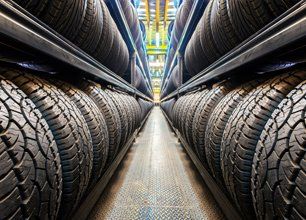The Environmental Benefits of Correct Tire Upkeep
Keeping appropriate tire care is typically forgotten, yet its impact on the environment is extensive. Correct tire maintenance not just expands the life-span of tires yet additionally reduces landfill waste and adds to improved air quality.
Lowered Fuel Consumption
Improving tire maintenance methods can lead to a considerable decrease in gas consumption for vehicles. According to the U.S. Department of Power, underinflated tires can decrease gas mileage by 0.2% for every 1 psi decrease in pressure in all four tires.
In enhancement to tire stress, normal tire rotations and positionings likewise play an essential role in gas efficiency. Erratically used tires can raise gas consumption as the engine functions harder to preserve speed and grip. By keeping appropriate alignment and rotating tires at advised intervals, motorists can ensure even prolong the life and use of their tires, eventually conserving fuel and reducing their carbon footprint.
Extended Tire Lifespan
Extending the life expectancy of tires is a vital facet of reliable automobile upkeep methods that can yield price savings and environmental benefits over time. By appropriately keeping tires, chauffeurs can dramatically extend their functionality, reducing the regularity at which brand-new tires require to be produced and old ones dealt with. This not just preserves useful resources however additionally lessens the power and discharges linked with tire manufacturing and disposal procedures.
Consistently examining tire stress, turning tires, and ensuring proper positioning are essential action in expanding tire life expectancy. Appropriate step deepness is crucial for optimal grip and safety, but it likewise contributes in for how long tires can be used prior to requiring replacement. In addition, preventing hostile driving behaviors that speed up tire wear, such as harsh stopping and doglegs, can even more boost tire longevity.
Eventually, increasing the long life of tires through proactive maintenance not just benefits the environment by lowering waste and saving sources yet additionally causes cost financial savings for car proprietors by postponing the need for brand-new tire purchases.
Reduced Exhausts Output
Effective tire maintenance practices add to a decrease in exhausts result, lining up with ecological sustainability goals in the vehicle industry. Correctly filled with air tires, regularly turned and aligned, can improve gas efficiency, therefore decreasing the total co2 exhausts from vehicles. When tires are underinflated, the engine has to work harder to thrust the automobile, causing raised gas consumption and higher exhausts. By keeping ideal tire pressure degrees, vehicle drivers can aid alleviate these unfavorable environmental influences.
In addition, well-maintained tires likewise boost grip and reduce rolling resistance, even more boosting fuel performance. This, consequently, reduces the quantity of exhaust gases released right into the ambience. Furthermore, guaranteeing tires are correctly inflated and lined up can prolong the life-span of the tires, minimizing the regularity of tire substitutes and the linked ecological expenses of tire manufacturing and disposal.

Lowered Garbage Dump Waste
Offered the favorable effect of proper tire upkeep on decreasing discharges result, one more substantial ecological benefit is the capacity for lowered garbage dump waste. By ensuring that tires are properly pumped up, aligned, well balanced, and rotated consistently, their lifespan can be substantially extended.

Improved Air High Quality
Enhancing air high quality via appropriate tire maintenance practices is an important element of sustainable ecological stewardship. official statement When tires are underinflated, they create a lot more moving resistance, leading to increased gas consumption and higher discharges of hazardous contaminants such as carbon monoxide and nitrogen oxides. Properly inflated tires not only improve fuel effectiveness however additionally lower the amount of contaminants released into the air.
In addition, well-maintained tires with correct step depth and positioning add to more secure driving conditions, minimizing the possibility of mishaps that can cause the launch of additional pollutants right into the environment. By prolonging the lifespan of tires via routine upkeep and rotation, fewer tires are thrown out too soon, reducing the environmental influence of tire disposal and production procedures.
Final Thought
In final thought, appropriate tire maintenance provides numerous environmental benefits. It is important for people to focus on tire upkeep as a basic yet efficient means to shield the atmosphere for future generations.
Proper tire maintenance not just extends the life-span of tires however likewise lowers garbage dump waste and contributes to improved air top quality - tire tracks morris il. By maintaining appropriate positioning and turning tires at suggested periods, drivers can guarantee even extend the life and use of their tires, inevitably conserving gas and reducing their carbon footprint
By appropriately preserving tires, chauffeurs can significantly lengthen important site their usability, reducing the regularity at which new tires need to be made and old ones disposed of.Frequently examining tire pressure, revolving tires, and making certain appropriate placement are vital steps in expanding tire life expectancy. In addition, guaranteeing tires are correctly pumped up and aligned can expand the life expectancy of the tires, reducing the frequency of tire replacements and the associated ecological costs of tire manufacturing and disposal.